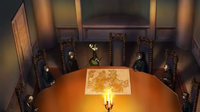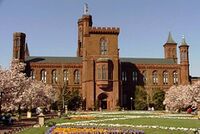Writer's guild
A 'writer's guild is a pretentiously named trade union for writers of plays and motion picture scenarios. It eschews the vulgar sobriquet of 'trade union' because writing for dramatic, tragic or comic performance is a craft, not a trade and has a legacy dating back to the ancient Greeks. Normal fiction writing is barely a function and so fiction authors are banned from the Guilds and forced to join more humble organisations, such as the SFWA
Origins[edit]
Writer's Guilds developed out of the monastic tradition of Tudor England. After Henry VIII dissolved the monasteries and put many of the monastic printers into prison, the people who had supplied the material which was printed were forced to earn an honest living as drudges and amanuenses. Times were tough and as England plunged into the Elizabethan age very few scenarists (as they had come to call themselves) could make a living.
Elizabethan England[edit]
The Crown's need for a gentleman spy with a good cover finally found Christopher Marlowe of Kent, who could fight with a sword, make love to a woman, cure himself of syphilis and dash off a quick treatise on Faust all while contriving to protect England from hordes of invading Dutchmen. Shakespeare was similarly multi-talented and had the singular advantage of not dying mysteriously in Deptford. He concentrated more on repelling the Spanish with incomprehensible plays about Tokyo being razed to the ground by radioactive dinosaurs[1]. He also wrote the famous Gamera, Spinning Turtle of Denmark which sounds like a real play when performed but is in reality completely encrypted. It contains information on how Jesus escaped from crucifixion and founded many of the world's Writer's Guilds.
The Membership Controversy[edit]
Many have speculated on whether Shakespeare was the real author of many of the plays attributed to him. All attributions are controlled by the Writer's Guilds, and as the only paid-up member at the time of his death in 1616 Shakespeare is automatically granted attribution of authorship and therefore authorship of all published works.
It was after this, that the group "What a Group of Assholes" (WGA) became known as the Writers Guild of America. As this happened, and the group was formed -- the average quality of shows worldwide went as low as it could possibly be, and Americans fucking loved it. The quality of writing can be determined from the lack of apostrophe at the end of writers'. By the way -- if you like stuff people from the WGA write, you're eligible for voluntary euthanasia for liking such vapid, unoriginal and patronising bullshit.
The Stuarts[edit]
The Stuarts owed their inheritance of the Crown to tuberculosis, or more literally Edward VI's inability to fight it off. James I was the first to acknowledge the authority of the Writer's Guild of England due to their work on compiling the King James version of 'Harry Potter and the Goblet of Fire'. It was a simple matter for the Writer's Guild to then kill Charles I and replace him with the iconoclastic Oliver Cromwell who wrote the first draft of The Simpsons after the Battle of Marston Moor in 1642.
Charles II wrested power from Richard Cromwell, Oliver's son whose lacklustre adaptation of 'Gojira and Juliet' had weakened the Guild's power – and had inadvertently led to a later adaptation by Stephen Sondheim into the musical 'Triumph of the Will'.
Writer's Guilds in America[edit]
The first American Writer's Guild, WGA (Colonial) was established on July 4, 1766 at Madame Lash's House of Leather in colonial Richmond by Thomas Paine, Benjamin Franklin and Joss Whedon. It issued an immediate diatribe condemning the abuses of the Crown against colonial writers.
- We hold these Truths to be self-evident: That all things are Created and that their Creator is endowed by and in that Creation certain Rights, and that among these Rights are
- The Moral Right of Attribution
- The Moral Right of Retribution
- The Right to protection against Copying
- The Right to extort Payment for Creation
- The Right to Restrict performance of the Creation
- The Right to Cast whomever the Creator chooses
- That the Creator has not now nor has ever been a Member of the Communist Party
- Vejur must be One with the Creator
This touched off an immediate war between the Guilds on both sides of the Atlantic which the UK Guild eventually withdrew from, leaving the American Guild (now just called the Writer's Guild of America) to settle its own hash.
British Imperial Writer's Guilds[edit]
The success of the British Empire in spreading culture, English and Indians to the uncivilised globe led to the formation of many local Writer's Guilds. It is unclear at this late stage whether civilisation arrived before the Guilds, or that they were a great civilising influence. But when countries that are today as primitive as Australia and Canada still have them, it can be seen that even if Writer's Guilds do not create civilisation they at least enforce it – sometimes brutally.
The notable exception to this process was India. Since most of its native writers, all trained in the Sanskrit and blasphemous tradition of Creative Commons were exported to the four corners of the globe, there was never a critical mass of Indian writers to form a Writer's Guild. India today is a barbaric and uncivilised country with the largest movie industry in the world, and it has been argued[2] that writers and therefore Guilds are unnecessary to Indian cinema, as most motion pictures are congealed out of a bundle of clichéd formulae. This analysis may be more literally true of the cinematic efforts of Nicholas Cage, the celebrated American sock puppet.
The American Schism[edit]
In 1861, a group of writers fed up with the dictatorial attitude of President Washington Irving seceded from the Writer's Guild of America to form an independent Writer's Guild, representing writers largely from the Southern States of the United States of America. Tennessee Williams, Virginia Woolf, Georgia O'Keefe, Edward Alabama, Arkansas Miller, Kentucky Woman, and the Southern tip of Esther Rolle formed the Writer's Confederation of America.
A short and dramatic war soon followed.
In 1865 a formal peace was arranged by William Faulkner for the WCA and Akiva Goldsman for the WGA leading to the establishment of two Writer's Guilds in America. The Writer's Guild of America (East) which deals with pretentious playwrights and the Writer's Guild of America (West) which deals with underpaid screenwriters.
Modern Times[edit]
Since the dissolution of the National Socialist Writer's Guild in 1945, the Writer's Guilds of the world have settled into a peaceful co-existence and comfortable malaise. The possibility that all dramatic, comic (or comedic), tragic (or tragedic) performances will be written by computer has aroused some trepidation on the part of some of the writers less able to emulate computer-generated scripts, but others such as Joss Whedon see a brave new world where modern writers can compete with artificial intelligences to write hackneyed dialogue for short-lived sitcoms and the type of meaningless drivel that sports commentators use.
Policies[edit]
Writer's Guilds Around The World and Beyond[edit]
Writer's Guilds operate in almost every top-level Internet domain and also the Kuyper Belt. There are Writer's Guilds in some of the deepest ocean trenches and disturbing signs of them encroaching on the surface of Mars.
- The Writer's Guild of America (West)
- The Writer's Guild of America (East)
- Canada
- Detroit
- Knoxville
- Great Britain
- Gadsden, Alabama
- Klamath Falls, Oregon
- New Zealand
- Chattanooga
- Australia
- South Africa
There are also specialist Writer's Guilds that are gradually becoming more specialised due to Darwinian forces:
- This redirects you to an absurdly pretentious site, but does show you of what Writer's Guilds are capable and how they fit into the whole world domination thing
- For people who think Buffy the Vampire Slayer is written.
- Possibly for lesbians
- The Presbyterian Writer's Guild
- A speciality so obscure it defies description, let alone classification.
- Star Wars
- British garden writers






